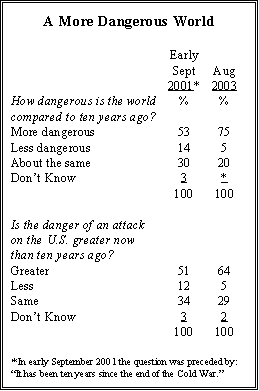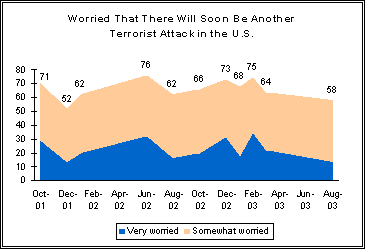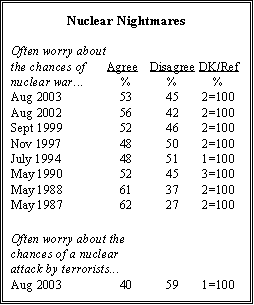Summary of Findings

As the second anniversary of the Sept. 11 terrorist attacks approaches, heightened public concern about international threats persists. Fully three-quarters of Americans see the world as a more dangerous place than a decade ago, up from 53% in a Pew survey conducted in early September 2001, just prior to the terrorist strikes on New York and Washington. Similarly, the percentage who think the United States faces greater danger of a biological, nuclear or chemical attack rose from 51% two years ago to 64% today.
The current Pew survey also finds a majority of Americans (53%) saying they often worry about the prospects of nuclear war. Moreover, four-in-ten say they often worry about the chances that terrorists may attack the U.S. with nuclear weapons.
The threat of terrorism is now part of the fabric of American life. Fully 74% of Americans believe that occasional acts of terrorism will be part of life in the future, compared with 22% who disagree. Since Sept. 11, worries over renewed terrorism have fluctuated, but majorities have consistently expressed at least some concern over the possibility of another attack. These fears tend to increase when the government warns of a heightened risk of terrorism.

This year, terrorism concerns reached a peak in February, shortly after the Department of Homeland Security raised the nation’s terrorist alert status to Code Orange. At the time, three-quarters of Americans said they were worried there would be soon be another attack in the U.S. (34% very worried/41% somewhat worried). Concerns have subsided somewhat since then; roughly six-in-ten (58%) now say they are very (13%) or somewhat worried (45%) about the possibility of a new attack.
The public’s ratings of the government’s antiterrorism efforts have remained fairly stable over the past year, but are well below levels recorded shortly after the attacks. About one-in-five Americans (19%) say the government is doing very well reducing the threat of terrorism and 56% say it is doing fairly well. Those numbers are largely unchanged from November 2002 (15% very well/54% fairly well). In October 2001, nearly half of Americans (48%) said the government was doing very well in the terrorism fight while 40% said it was doing fairly well.
Nuclear War Fears Persist

A significant minority of Americans express anxiety about the possibility of terrorists using a nuclear weapon against the U.S. Overall, 40% agree with a statement that “I often worry about the chances of a nuclear attack by terrorists”; 16% completely agree, and 24% mostly agree. Women, African-Americans, and parents are significantly more worried about the chances of a nuclear terrorist attack than are men, whites, and non-parents.
Still, the public is less worried about terrorists using nuclear weapons than about the prospects of nuclear war in general. Over half (53%) agree that “I often worry about the chances of nuclear war,” which is down slightly from last year (56%). Concerns over the prospect of nuclear war are in line with the 1990s. In 1987 and 1988, when Cold War tensions were still present, roughly six-in-ten said they often worried about a nuclear conflict (62% in 1987, 61% in 1988).
These results are based on a national telephone survey of 2,528 adults conducted July 14-August 5, 2003.




